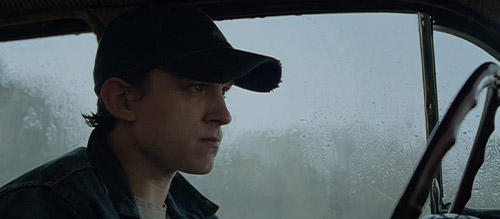
The Devil All the Time (2020)
Director: Antonio Campos
Screenwriters: Antonio Campos, Paulo Campos
Starring: Bill Skarsgård, Tom Holland, Robert Pattinson, Hayley Bennett, Kristin Griffith, Eliza Scanlen, Harry Mewling, Mia Wasikowska
Religion-fueled thriller The Devil All the Time has managed to capture the attention of an unusually wide audience for a story set in the bible belt of the United States. This gritty southern tale from the book of the same name by Donald Ray Pollock, and adapted by director Antonio Campos (Christine, 2016) and brother Paulo Campos, has become something of a cultural must-watch due to its long list of popular cast members – Bill Skarsgård, Robert Pattinson, Tom Holland, more – and its relative accessibility on Netflix. Readers of Pollock’s rich and layered novel will understand the difficulties that the screenwriting duo faced when adapting “The Devil All the Time” into a feature film – not least its complex presentation of intertwining stories set over a number of decades, as well as any number of incredibly violent moments – yet the two New York born brothers have managed to forge a fresh take on a familiar old film genre that, despite feeling laborious at points and certainly being more of a slow-burner than you may expect, will leave you guessing at every twist and turn.
Set across a number of decades in the mid 20th century, The Devil All the Time begins in 1950 Ohio with traumatised ex marine Willard Russell (Bill Skarsgård) and the story of how he meets his wife Charlotte (Hayley Bennett). From there, the film chronicles their bringing of a son into the world (Arvin, played by Michael Banks Repeta, and later Tom Holland) while integrating a number of secondary narratives that will come to mean more as the story unravels, time bringing each of the separate stories together as The Devil All the Time eats more and more into its 2 hours and 18 minutes runtime. Religion is the central theme of the movie, and is vital to each of the storylines and their connections to one another, but like all good films of the religiously fueled bible-belt thriller sub-genre, the presentation of faith is much darker here than in many other forms of media. Here there’s manipulation, delusion and abuse aplenty, with death (through many means) never being too far away.
Death, especially of a gruesome nature, is commonly revisited throughout The Devil All the Time, it being intrinsically linked to the religious turmoil of blind faith and corrupt powers. The deaths that have a sacrificial feel end up leaving a bitter taste in your mouth, as do the murders of a serial killing couple that bullet point the central action with their own unique storyline and legacy within the universe itself. Even the deaths that are presented as justifiable are drenched in a sense of regret and sadness, each being committed as a response to insanity and inhumanity in a fearful rather than righteous manner. It’s a genuine strong point of the adaptation, as whether a death comes from murder, suicide or illness, the film never fails to land a punch to the gut, each character being fleshed out more than enough to make you at least feel for their passing.
Perhaps due to this commitment to character development and the inherent complexity of the story, Campos’ adaptation does, for large periods, feel as if it is filling time with blank space. For someone fresh to The Devil All the Time, for example someone who hasn’t read the novel, there are plenty of details that feel irrelevant, especially early on, and after about one hour of runtime the film does begin to drag, so much so that the eerie settings and impeccable acting at times become difficult to remain focused upon. There is, of course, retrospective value to most of these moments, and fans of the novel will no doubt be pleased to see at least the attempt at fleshing out characters who are given more time in the original material, but from a purely entertainment perspective, this could have benefited from shaving 20 minutes or so from its eventual runtime.
Despite the promise of its cast and its clearly talented director, as well as the popularity of its original material, The Devil All the Time is, then, a slight disappointment overall, though much of this is owed to the complexity of the adaptation process. The original novel offered something unique, challenging and potentially very cinematic, but the depth of Pollock’s work proved to be restricting in this instance, The Devil All the Time still presenting an interesting story with strong performances and a thought-provoking thematic exploration of religious ideologies, but ultimately running for too long and at too slow of a pace to attract those more accustomed to fast paced narratives and all the expectations that come with a thriller of this type.
16/24

